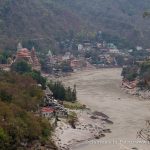The Great Derangement – Climate Change and the Unthinkable – by Amitav Ghosh
Amitav Ghosh needs no introduction. He is one of India’s finest writers and is a Sahitya Akademi award winner. His book “The Hungry Tide” had just hit the stands when the tsunami caused unimaginable devastation and his subsequent series of articles on Tsunami had a profound impact on many of us.

The Great Derangement
We have been writing on issues of global warming and climate change. However, when such a famous author writes a book on Climate Change, it is an important event and the impact is far reaching. So it is indeed a shot in the arm for the climate change movement.
A literary figure like Amitav Ghosh writing on Climate Change surprises many people. Acknowledging it, he says “climate change casts a much smaller shadow within the landscape of literary fiction than it does even in the public arena…” he avers that the mere mention of climate change “is often enough to relegate a novel or a short story to the genre of science fiction. It is as though in the literary imagination climate change were somehow akin to extraterrestrials or interplanetary travel… if the urgency of a subject were indeed a criterion of its seriousness, then, considering what climate change actually portends for the future of the earth, it should surely follow that this would be the principal preoccupation of writers the world over- and this, I think, is very far from being the case”.
The author has done a thorough research and this book does a great job of explaining the various facets of climate change in a lucid, yet thorough manner so that even the most learned climate change activists will find it useful. The book is divided into three parts: Stories, History and Politics.
In Stories, the Author talks about the reason for writing the book by writing about his personal details, from his parents shifting from their ancestral village due to the river swallowing their village, and then recounts his experiences of a tornado and other stories.
He has termed his parents as the first ecological refugees who had to shift as the river swallowed their village.
Climate Change- Hand of Man
He eloquently writes about climate change as a man-made phenomena “the events set in motion by global warming have a more intimate connection with humans than did the climatic phenomena of the past – this is because we have all contributed in some measure, great or small, to their making. They are the mysterious work of our own hands returning to haunt us in unthinkable shapes and forms”. (page 43)
Modern day planning exacerbating Impact of Climate Change:
From seventeenth century onwards man started building cities on the seafronts. He says that “through much of human history, people regarded the ocean with great wariness. Even when they made their living from the sea, through fishing or trade, they generally did not build large settlements on the water’s edge: the great old port cities of Europe, like London, Amsterdam, Rotterdam, Stockholm, Lisbon and Hamburg, are all protected from the open ocean by bays, estuaries, or deltaic river systems. The same is true of old Asian ports: Cochin, Surat, Tamluk, Dhaka, Mrauk-U, Guangzhoud, Hangzhou and Malacca are all cases in point. It is as if, before the modern era, there had existed a general acceptance that provision had to be made for the unpredictable furies of the ocean – tsunamis, storm surges and the like”. (page 49)
Highlighting the faulty role of modern day planners, who go scot free even though our cities come to a grinding halt in a climate change related disaster, the author writes “a special place ought to be reserved in hell, I thought to myself, for planners who build with such reckless disregard for their surroundings”. (page 48)
Visions of Climate change induced storm on Mumbai:
“Because of the density of its population and the importance of its institutions and industries, Mumbai represents an extraordinary, possibly unique, concentration of risk.” He goes on to quote research from a paper by a Japanese research team which “predicts a 46 per cent increase in tropical cyclone frequency in the Arabian Sea by the end of the next century, with a corresponding 31 per cent decrease in the Bay of Bengal….Another paper, by an American research team, concludes that cyclonic activity in the Arabian Sea is also likely to intensify because of the cloud of dust and pollution that now hangs over the Indian subcontinent and its surrounding waters: this too is contributing to changes in the region’s wind patterns”. (page 55)
“What might happen if a Category 4 or 5 storm, with 240 kmph or higher wind speeds, were to run directly into Mumbai?” “Many of Mumbai’s tall buildings have large glass windows; few, if any, are reinforced. In a cyclone, these exposed expanses of glass will have to withstand not just hurricane-strength winds but also flying debris. Many of the dwellings in Mumbai’s informal settlements have roofs made of metal sheets and corrugated iron; cyclone-force winds will turn these, and the thousands of billboards that encrust the city, into deadly projectiles, hurling them with great force at the glass-wrapped towers that soar above the city”.
“Of the worlds megacities, Mumbai is one of the few that has a nuclear facility within its urban limits: the Bhabha Atomic Research Centre at Trombay. To the north, at Tarapur, 94 kilometers from the city’s periphery, lies another nuclear facility both these plants sit right upon the shoreline, as do many other nuclear installations around the world: these locations were chosen in order to give them easy access to water. With climate change many nuclear plants around the world are now threatened by rising seas. During massive storms there is a greatly increased chance of the loss of power at a nuclear power plant which significantly contributes to safety risks. Essential cooling systems could fail; safety systems could be damaged; contaminants could seep into the plant and radioactive water could leak out, as happened at the Fukushima Daiichi plant”.
Climate Change – Impact of Empire & Imperialism:
In the second part of his book titled History, Amitav Ghosh has also looked at climate change from the perspective of the empire and imperialism. He says the “discourse on global warming remains largely Eurocentric. This is why the case for Asia’s centrality to the climate crisis does need to be laid out in some detail, even if it is at the cost of stating the obvious”.
“The West’s largest contribution to the accumulation of greenhouse gases came about through the continuous expansion of the carbon footprint of what was about 30 per cent of the world’s population at the beginning of the twentieth century. Asia’s contribution, on the other hand, came about through a sudden but very small expansion in the footprint of a much larger number of people, perhaps as much as half of a greatly expanded global population, late in the twentieth century”. The climate crisis would have come upon us sooner had Asia industrialised at the same time as the West. Imperialism played a huge role in delaying the growth of industrialisation in Asia, as a result of which the economies of Asia “launched upon a period of sustained economic expansion in the late 1980s. It is this acceleration that has dramatically shortened the time available to adapt to, or even recognize, the crisis for what it is.”
Amitav Ghosh has written in detail how the imperial forces restrained the economies of India, China, Burma etc. He explains the oil economy of Burma in the 1850s till 1885 when the British took over the oil fields of Yenangyaung which became the nucleus of Burmah-Shell corporation, the present day oil giant Shell. He explains the growth of shipbuilding in India and how the British Parliament passed the Registry Act to bar Indian ships and sailors from British ports.
Interestingly Amitav Ghosh also brings to the fore the moral angle against consumerism which restrained Asia’s adoption of a high carbon lifestyle. He Quotes Mahatma Gandhi writing in 1928 “God forbit that India should ever take to industrialism after the manner of the West. If an entire nation of 300 millions took to similar economic exploitation, it would strip the world bare like locusts”.
Amitav Ghosh infers that Gandhi’s quote “is striking because of the directness with which it goes to the heart of the matter: numbers. It is proof that Gandhi, like many others, understood intuitively what Asia’s history would eventually demonstrate: that the universalist premise of industrial civilization was a hoax; that a consumerist mode of existence, if adopted by a sufficient number of people, would quickly become unsustainable and would lead, literally, to the devouring of the planet.”
In my articles, I often talk about our culture and its underlying message of preserving our environment and wildlife. So it was interesting to find that Amitav Ghosh too shares similar views. In the third part of book titled Politics, he argues “if religious groupings around the world can join hands with popular movements, they may well be able to provide the momentum that is needed for the world to move forward on drastically reducing emissions without sacrificing considerations of equity. That many climate activists are already proceeding in this direction is, to me, yet another sign of hope”.
Though I have extensively quoted the author, it is simply the tip of an iceberg. “The Great Derangement, Climate Change and the Unthinkable” by Amitav Ghosh is a seminal work.
This 275 pages long book comes in hard bound and is Priced at Rs. 399/- but is currently available in Amazon at Rs. 231/- only. I can’t find a more appropriate gift item for many of friends and colleagues.
It is highly recommended as a must reading for all.
You can buy the book from Amazon India Link:
- GoPro Hero 12 Black - 6 September,2023
- Leopards: The Last Stand - 2 July,2023
- Drifting in the Waters of Sundarbans - 26 March,2023













I would like to read it for sure..Thank you Sabya sir:)